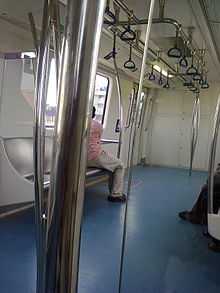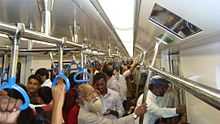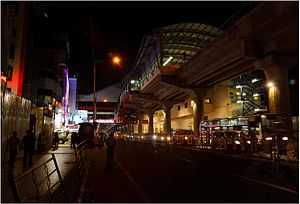Purple Line (Namma Metro)
| Purple Line | |||||||||||||||||||||||||||||||||||||||||||||||||||||||||||||||||||||||||||||||||||||||||||||||||||||||||||||||||||||||||||||||||||||||||||||||||||||||||||||||||||||||||||||||||||||||||||||||||||||||||||||||||||||||||||||||||||||||||||||||||||||||||||||||||||||||||||||||||||||||||||||||||||||||||||||||||||||||||||||||||||||||||||||||||||||||||||||||||||||||||||||||||||||||||||||||||||||||||||||||||||||||||||||||||||||||||||||||||||||||||||||||||||||||||||||||||||||||||||||||||||||||||||||||||||||||||||||||||||||||||||||||||||||||||||||||||||||||||||||||||||||||||||||||||||||||||||||||||||||
|---|---|---|---|---|---|---|---|---|---|---|---|---|---|---|---|---|---|---|---|---|---|---|---|---|---|---|---|---|---|---|---|---|---|---|---|---|---|---|---|---|---|---|---|---|---|---|---|---|---|---|---|---|---|---|---|---|---|---|---|---|---|---|---|---|---|---|---|---|---|---|---|---|---|---|---|---|---|---|---|---|---|---|---|---|---|---|---|---|---|---|---|---|---|---|---|---|---|---|---|---|---|---|---|---|---|---|---|---|---|---|---|---|---|---|---|---|---|---|---|---|---|---|---|---|---|---|---|---|---|---|---|---|---|---|---|---|---|---|---|---|---|---|---|---|---|---|---|---|---|---|---|---|---|---|---|---|---|---|---|---|---|---|---|---|---|---|---|---|---|---|---|---|---|---|---|---|---|---|---|---|---|---|---|---|---|---|---|---|---|---|---|---|---|---|---|---|---|---|---|---|---|---|---|---|---|---|---|---|---|---|---|---|---|---|---|---|---|---|---|---|---|---|---|---|---|---|---|---|---|---|---|---|---|---|---|---|---|---|---|---|---|---|---|---|---|---|---|---|---|---|---|---|---|---|---|---|---|---|---|---|---|---|---|---|---|---|---|---|---|---|---|---|---|---|---|---|---|---|---|---|---|---|---|---|---|---|---|---|---|---|---|---|---|---|---|---|---|---|---|---|---|---|---|---|---|---|---|---|---|---|---|---|---|---|---|---|---|---|---|---|---|---|---|---|---|---|---|---|---|---|---|---|---|---|---|---|---|---|---|---|---|---|---|---|---|---|---|---|---|---|---|---|---|---|---|---|---|---|---|---|---|---|---|---|---|---|---|---|---|---|---|---|---|---|---|---|---|---|---|---|---|---|---|---|---|---|---|---|---|---|---|---|---|---|---|---|---|---|---|---|---|---|---|---|---|---|---|---|---|---|---|---|---|---|---|---|---|---|---|---|---|---|---|---|---|---|---|---|---|---|---|---|---|---|---|---|---|---|---|---|---|---|---|---|---|---|---|---|---|---|---|---|---|---|---|---|---|---|---|---|---|---|---|---|---|---|---|---|---|---|---|---|---|---|---|---|---|---|---|---|---|---|---|---|---|---|---|---|---|---|---|---|---|---|---|---|---|---|---|---|---|---|---|---|---|---|---|---|---|---|---|---|---|---|---|---|---|---|---|---|---|---|---|---|---|---|---|---|---|---|---|---|---|---|---|---|---|---|---|---|---|---|---|---|---|---|---|---|---|---|---|---|---|---|---|---|---|---|---|---|---|---|---|---|---|---|---|---|---|---|---|---|---|---|---|---|---|---|---|---|---|---|---|---|---|---|---|---|---|---|---|---|---|---|---|---|---|
|
Purple Line train | |||||||||||||||||||||||||||||||||||||||||||||||||||||||||||||||||||||||||||||||||||||||||||||||||||||||||||||||||||||||||||||||||||||||||||||||||||||||||||||||||||||||||||||||||||||||||||||||||||||||||||||||||||||||||||||||||||||||||||||||||||||||||||||||||||||||||||||||||||||||||||||||||||||||||||||||||||||||||||||||||||||||||||||||||||||||||||||||||||||||||||||||||||||||||||||||||||||||||||||||||||||||||||||||||||||||||||||||||||||||||||||||||||||||||||||||||||||||||||||||||||||||||||||||||||||||||||||||||||||||||||||||||||||||||||||||||||||||||||||||||||||||||||||||||||||||||||||||||||||
| Overview | |||||||||||||||||||||||||||||||||||||||||||||||||||||||||||||||||||||||||||||||||||||||||||||||||||||||||||||||||||||||||||||||||||||||||||||||||||||||||||||||||||||||||||||||||||||||||||||||||||||||||||||||||||||||||||||||||||||||||||||||||||||||||||||||||||||||||||||||||||||||||||||||||||||||||||||||||||||||||||||||||||||||||||||||||||||||||||||||||||||||||||||||||||||||||||||||||||||||||||||||||||||||||||||||||||||||||||||||||||||||||||||||||||||||||||||||||||||||||||||||||||||||||||||||||||||||||||||||||||||||||||||||||||||||||||||||||||||||||||||||||||||||||||||||||||||||||||||||||||||
| Type | Metro | ||||||||||||||||||||||||||||||||||||||||||||||||||||||||||||||||||||||||||||||||||||||||||||||||||||||||||||||||||||||||||||||||||||||||||||||||||||||||||||||||||||||||||||||||||||||||||||||||||||||||||||||||||||||||||||||||||||||||||||||||||||||||||||||||||||||||||||||||||||||||||||||||||||||||||||||||||||||||||||||||||||||||||||||||||||||||||||||||||||||||||||||||||||||||||||||||||||||||||||||||||||||||||||||||||||||||||||||||||||||||||||||||||||||||||||||||||||||||||||||||||||||||||||||||||||||||||||||||||||||||||||||||||||||||||||||||||||||||||||||||||||||||||||||||||||||||||||||||||||
| System | Namma Metro | ||||||||||||||||||||||||||||||||||||||||||||||||||||||||||||||||||||||||||||||||||||||||||||||||||||||||||||||||||||||||||||||||||||||||||||||||||||||||||||||||||||||||||||||||||||||||||||||||||||||||||||||||||||||||||||||||||||||||||||||||||||||||||||||||||||||||||||||||||||||||||||||||||||||||||||||||||||||||||||||||||||||||||||||||||||||||||||||||||||||||||||||||||||||||||||||||||||||||||||||||||||||||||||||||||||||||||||||||||||||||||||||||||||||||||||||||||||||||||||||||||||||||||||||||||||||||||||||||||||||||||||||||||||||||||||||||||||||||||||||||||||||||||||||||||||||||||||||||||||
| Locale | Bangalore, Karnataka, India | ||||||||||||||||||||||||||||||||||||||||||||||||||||||||||||||||||||||||||||||||||||||||||||||||||||||||||||||||||||||||||||||||||||||||||||||||||||||||||||||||||||||||||||||||||||||||||||||||||||||||||||||||||||||||||||||||||||||||||||||||||||||||||||||||||||||||||||||||||||||||||||||||||||||||||||||||||||||||||||||||||||||||||||||||||||||||||||||||||||||||||||||||||||||||||||||||||||||||||||||||||||||||||||||||||||||||||||||||||||||||||||||||||||||||||||||||||||||||||||||||||||||||||||||||||||||||||||||||||||||||||||||||||||||||||||||||||||||||||||||||||||||||||||||||||||||||||||||||||||
| Termini |
Whitefield Kengeri | ||||||||||||||||||||||||||||||||||||||||||||||||||||||||||||||||||||||||||||||||||||||||||||||||||||||||||||||||||||||||||||||||||||||||||||||||||||||||||||||||||||||||||||||||||||||||||||||||||||||||||||||||||||||||||||||||||||||||||||||||||||||||||||||||||||||||||||||||||||||||||||||||||||||||||||||||||||||||||||||||||||||||||||||||||||||||||||||||||||||||||||||||||||||||||||||||||||||||||||||||||||||||||||||||||||||||||||||||||||||||||||||||||||||||||||||||||||||||||||||||||||||||||||||||||||||||||||||||||||||||||||||||||||||||||||||||||||||||||||||||||||||||||||||||||||||||||||||||||||
| Stations |
6 17 (Phase I) 36 (Phase II) | ||||||||||||||||||||||||||||||||||||||||||||||||||||||||||||||||||||||||||||||||||||||||||||||||||||||||||||||||||||||||||||||||||||||||||||||||||||||||||||||||||||||||||||||||||||||||||||||||||||||||||||||||||||||||||||||||||||||||||||||||||||||||||||||||||||||||||||||||||||||||||||||||||||||||||||||||||||||||||||||||||||||||||||||||||||||||||||||||||||||||||||||||||||||||||||||||||||||||||||||||||||||||||||||||||||||||||||||||||||||||||||||||||||||||||||||||||||||||||||||||||||||||||||||||||||||||||||||||||||||||||||||||||||||||||||||||||||||||||||||||||||||||||||||||||||||||||||||||||||
| Daily ridership | 15,775 (March 2014)[1] | ||||||||||||||||||||||||||||||||||||||||||||||||||||||||||||||||||||||||||||||||||||||||||||||||||||||||||||||||||||||||||||||||||||||||||||||||||||||||||||||||||||||||||||||||||||||||||||||||||||||||||||||||||||||||||||||||||||||||||||||||||||||||||||||||||||||||||||||||||||||||||||||||||||||||||||||||||||||||||||||||||||||||||||||||||||||||||||||||||||||||||||||||||||||||||||||||||||||||||||||||||||||||||||||||||||||||||||||||||||||||||||||||||||||||||||||||||||||||||||||||||||||||||||||||||||||||||||||||||||||||||||||||||||||||||||||||||||||||||||||||||||||||||||||||||||||||||||||||||||
| Operation | |||||||||||||||||||||||||||||||||||||||||||||||||||||||||||||||||||||||||||||||||||||||||||||||||||||||||||||||||||||||||||||||||||||||||||||||||||||||||||||||||||||||||||||||||||||||||||||||||||||||||||||||||||||||||||||||||||||||||||||||||||||||||||||||||||||||||||||||||||||||||||||||||||||||||||||||||||||||||||||||||||||||||||||||||||||||||||||||||||||||||||||||||||||||||||||||||||||||||||||||||||||||||||||||||||||||||||||||||||||||||||||||||||||||||||||||||||||||||||||||||||||||||||||||||||||||||||||||||||||||||||||||||||||||||||||||||||||||||||||||||||||||||||||||||||||||||||||||||||||
| Opening | 20 October 2011 | ||||||||||||||||||||||||||||||||||||||||||||||||||||||||||||||||||||||||||||||||||||||||||||||||||||||||||||||||||||||||||||||||||||||||||||||||||||||||||||||||||||||||||||||||||||||||||||||||||||||||||||||||||||||||||||||||||||||||||||||||||||||||||||||||||||||||||||||||||||||||||||||||||||||||||||||||||||||||||||||||||||||||||||||||||||||||||||||||||||||||||||||||||||||||||||||||||||||||||||||||||||||||||||||||||||||||||||||||||||||||||||||||||||||||||||||||||||||||||||||||||||||||||||||||||||||||||||||||||||||||||||||||||||||||||||||||||||||||||||||||||||||||||||||||||||||||||||||||||||
| Owner | Bangalore Metro Rail Corporation Limited (BMRCL) | ||||||||||||||||||||||||||||||||||||||||||||||||||||||||||||||||||||||||||||||||||||||||||||||||||||||||||||||||||||||||||||||||||||||||||||||||||||||||||||||||||||||||||||||||||||||||||||||||||||||||||||||||||||||||||||||||||||||||||||||||||||||||||||||||||||||||||||||||||||||||||||||||||||||||||||||||||||||||||||||||||||||||||||||||||||||||||||||||||||||||||||||||||||||||||||||||||||||||||||||||||||||||||||||||||||||||||||||||||||||||||||||||||||||||||||||||||||||||||||||||||||||||||||||||||||||||||||||||||||||||||||||||||||||||||||||||||||||||||||||||||||||||||||||||||||||||||||||||||||
| Character | Elevated and underground | ||||||||||||||||||||||||||||||||||||||||||||||||||||||||||||||||||||||||||||||||||||||||||||||||||||||||||||||||||||||||||||||||||||||||||||||||||||||||||||||||||||||||||||||||||||||||||||||||||||||||||||||||||||||||||||||||||||||||||||||||||||||||||||||||||||||||||||||||||||||||||||||||||||||||||||||||||||||||||||||||||||||||||||||||||||||||||||||||||||||||||||||||||||||||||||||||||||||||||||||||||||||||||||||||||||||||||||||||||||||||||||||||||||||||||||||||||||||||||||||||||||||||||||||||||||||||||||||||||||||||||||||||||||||||||||||||||||||||||||||||||||||||||||||||||||||||||||||||||||
| Technical | |||||||||||||||||||||||||||||||||||||||||||||||||||||||||||||||||||||||||||||||||||||||||||||||||||||||||||||||||||||||||||||||||||||||||||||||||||||||||||||||||||||||||||||||||||||||||||||||||||||||||||||||||||||||||||||||||||||||||||||||||||||||||||||||||||||||||||||||||||||||||||||||||||||||||||||||||||||||||||||||||||||||||||||||||||||||||||||||||||||||||||||||||||||||||||||||||||||||||||||||||||||||||||||||||||||||||||||||||||||||||||||||||||||||||||||||||||||||||||||||||||||||||||||||||||||||||||||||||||||||||||||||||||||||||||||||||||||||||||||||||||||||||||||||||||||||||||||||||||||
| Line length |
6.7 km 18.10 km (Phase I) 34.30 km (Phase II) | ||||||||||||||||||||||||||||||||||||||||||||||||||||||||||||||||||||||||||||||||||||||||||||||||||||||||||||||||||||||||||||||||||||||||||||||||||||||||||||||||||||||||||||||||||||||||||||||||||||||||||||||||||||||||||||||||||||||||||||||||||||||||||||||||||||||||||||||||||||||||||||||||||||||||||||||||||||||||||||||||||||||||||||||||||||||||||||||||||||||||||||||||||||||||||||||||||||||||||||||||||||||||||||||||||||||||||||||||||||||||||||||||||||||||||||||||||||||||||||||||||||||||||||||||||||||||||||||||||||||||||||||||||||||||||||||||||||||||||||||||||||||||||||||||||||||||||||||||||||
| Track gauge | 1,435 mm (4 ft 8 1⁄2 in) standard gauge | ||||||||||||||||||||||||||||||||||||||||||||||||||||||||||||||||||||||||||||||||||||||||||||||||||||||||||||||||||||||||||||||||||||||||||||||||||||||||||||||||||||||||||||||||||||||||||||||||||||||||||||||||||||||||||||||||||||||||||||||||||||||||||||||||||||||||||||||||||||||||||||||||||||||||||||||||||||||||||||||||||||||||||||||||||||||||||||||||||||||||||||||||||||||||||||||||||||||||||||||||||||||||||||||||||||||||||||||||||||||||||||||||||||||||||||||||||||||||||||||||||||||||||||||||||||||||||||||||||||||||||||||||||||||||||||||||||||||||||||||||||||||||||||||||||||||||||||||||||||
| Electrification | 750V DC Third rail | ||||||||||||||||||||||||||||||||||||||||||||||||||||||||||||||||||||||||||||||||||||||||||||||||||||||||||||||||||||||||||||||||||||||||||||||||||||||||||||||||||||||||||||||||||||||||||||||||||||||||||||||||||||||||||||||||||||||||||||||||||||||||||||||||||||||||||||||||||||||||||||||||||||||||||||||||||||||||||||||||||||||||||||||||||||||||||||||||||||||||||||||||||||||||||||||||||||||||||||||||||||||||||||||||||||||||||||||||||||||||||||||||||||||||||||||||||||||||||||||||||||||||||||||||||||||||||||||||||||||||||||||||||||||||||||||||||||||||||||||||||||||||||||||||||||||||||||||||||||
| Operating speed | 32 km/h (20 mph) | ||||||||||||||||||||||||||||||||||||||||||||||||||||||||||||||||||||||||||||||||||||||||||||||||||||||||||||||||||||||||||||||||||||||||||||||||||||||||||||||||||||||||||||||||||||||||||||||||||||||||||||||||||||||||||||||||||||||||||||||||||||||||||||||||||||||||||||||||||||||||||||||||||||||||||||||||||||||||||||||||||||||||||||||||||||||||||||||||||||||||||||||||||||||||||||||||||||||||||||||||||||||||||||||||||||||||||||||||||||||||||||||||||||||||||||||||||||||||||||||||||||||||||||||||||||||||||||||||||||||||||||||||||||||||||||||||||||||||||||||||||||||||||||||||||||||||||||||||||||
| |||||||||||||||||||||||||||||||||||||||||||||||||||||||||||||||||||||||||||||||||||||||||||||||||||||||||||||||||||||||||||||||||||||||||||||||||||||||||||||||||||||||||||||||||||||||||||||||||||||||||||||||||||||||||||||||||||||||||||||||||||||||||||||||||||||||||||||||||||||||||||||||||||||||||||||||||||||||||||||||||||||||||||||||||||||||||||||||||||||||||||||||||||||||||||||||||||||||||||||||||||||||||||||||||||||||||||||||||||||||||||||||||||||||||||||||||||||||||||||||||||||||||||||||||||||||||||||||||||||||||||||||||||||||||||||||||||||||||||||||||||||||||||||||||||||||||||||||||||||
The Purple Line of the Namma Metro is part of the metro rail system for the city of Bangalore, India, some of which is currently being constructed. Once finished, it will consist of 36 stations from Whitefield to Kengeri. The line will measure 40.10 kilometres (24.92 mi) and will be mostly elevated, with some stations underground. Currently only a 6.7 km stretch between Baiyyappanahalli and M. G. Road is operational. The line will connect the Eastern and Western areas of Bangalore.
History
The following dates represent the dates the section opened to the public, not the private inauguration.
| History | |||||
|---|---|---|---|---|---|
| Name | Extension date | Termini | Length | Stations | |
| Reach-1 | 20 October 2011 | Baiyappanahalli | M.G. Road | 6.70 kilometers (4.16 mi) | 6 |
| Reach-2 | Magadi Road | Mysore Road | 6.52 kilometers (4.05 mi) | 6 | |
| Underground Section | Minsk Square | Magadi Road | 4.88 kilometers (3.03 mi) | 4 | |
| Phase II Extensions | Whitefield | Baiyappanahalli | 15.50 kilometers (9.63 mi) | 14 | |
| Mysore Road | Kengeri | 4.88 kilometers (3.03 mi) | 5 | ||
| Total | Whitefield | Kengeri | 40.10 kilometers (24.92 mi) | 36 | |
The detailed project report (DPR) for Phase I, comprising the Purple and Green Lines, of Namma Metro project was prepared by the Delhi Metro Rail Corporation (DMRC) and submitted to the BMRCL in May 2003. The final approval on a scheme that incorporated the expertise of DMRC and RITES Limited did not come until April 2006.[2] The DPR prepared by DMRC envisaged a 33 km (21 mi) elevated and underground rail network with 32 stations for Phase I of the project. The proposed gauge was standard gauge unlike the broad gauge on the Delhi Metro network. The rationale for the metro includes reduced journey times, cutting fuel use, accident reduction and lower pollution.
Construction work for Phase I of the Namma Metro project was scheduled to start in 2005 but was delayed by a February 2006 change of government in Karnataka and continued debate over whether the project was financially feasible and appropriate for the city. Finally, on 25 April 2006 the Indian Cabinet approved the project, which was then budgeted at more than ![]() 54 billion (US$860 million).[3] The cost escalated to
54 billion (US$860 million).[3] The cost escalated to ![]() 116.09 billion (US$1.8 billion) as various problems delayed the completion.[4] BMRCL received
116.09 billion (US$1.8 billion) as various problems delayed the completion.[4] BMRCL received ![]() 7 billion (US$110 million) from Housing and Urban Development Corporation (HUDCO),
7 billion (US$110 million) from Housing and Urban Development Corporation (HUDCO), ![]() 250 million (US$4.0 million) from the Asian Development Bank (ADB), 23% from the Central Government, 33% from the State Government and the rest as a
250 million (US$4.0 million) from the Asian Development Bank (ADB), 23% from the Central Government, 33% from the State Government and the rest as a ![]() 49.05 billion (US$780 million) loan from the Japan International Cooperation Agency (JICA).[5][6] Navayuga Engineering was awarded the contract to construct Reach 1 of the Purple Line in 2006.[7] The foundation stone for the Phase I construction was laid by Prime Minister Manmohan Singh on 24 June 2006,[8] and civil construction on Reach I of the line, between M.G. Road and Baiyyappanahalli, commenced on 15 April 2007.[9] The underground work commenced in May 2011. Each corridor consists of two tunnels which are the first underground tunnels built for trains in South India. The tunnels, dug using tunnel boring machines (TBM), are located approximately 60 feet below ground level, have a diameter of 5.5metres and are 5metres apart. Four TBMs, nicknamed Helen (TBM 1), Margarita (TBM 2), Kaveri (TBM 3) and Krishna, were used for tunnelling work on the Purple Line.[10][11][12][13][14]
[15]
49.05 billion (US$780 million) loan from the Japan International Cooperation Agency (JICA).[5][6] Navayuga Engineering was awarded the contract to construct Reach 1 of the Purple Line in 2006.[7] The foundation stone for the Phase I construction was laid by Prime Minister Manmohan Singh on 24 June 2006,[8] and civil construction on Reach I of the line, between M.G. Road and Baiyyappanahalli, commenced on 15 April 2007.[9] The underground work commenced in May 2011. Each corridor consists of two tunnels which are the first underground tunnels built for trains in South India. The tunnels, dug using tunnel boring machines (TBM), are located approximately 60 feet below ground level, have a diameter of 5.5metres and are 5metres apart. Four TBMs, nicknamed Helen (TBM 1), Margarita (TBM 2), Kaveri (TBM 3) and Krishna, were used for tunnelling work on the Purple Line.[10][11][12][13][14]
[15]
Reach 1 was originally scheduled to begin operations in March 2010.[16] Reach 2, the remaining elevated section of Purple Line was scheduled to be completed by December 2012.[17] After the deadline was missed, the Bangalore Metro Rail Corporation Ltd (BMRCL) shifted the deadline to 31 December 2010. It was again changed to 4 April 2011 and then the date of inauguration was set at 15 September 2011. The next deadline set was 26 September 2011 which was also missed. The metro was finally opened to the public on 20 October 2011 at 4 pm IST by Union Urban Development Minister Kamal Nath.[16] There was an overwhelming response to the metro at the commencement of operations. As per BMRCL sources within first 3 days of operations 169,019 people used this mass transit system.[18] At the end of 4th day about 200,000 passengers had already commuted in Namma Metro. Namma Metro's first 12-day cumulative revenue was ![]() 10 million (US$160,000).[19] During the first month, since the opening of Reach I, about 1,325,000 people travelled by the metro.[20] On average, 41,390 people took the train every day, while the average daily revenue was
10 million (US$160,000).[19] During the first month, since the opening of Reach I, about 1,325,000 people travelled by the metro.[20] On average, 41,390 people took the train every day, while the average daily revenue was ![]() 667,262. The BMRC earned a revenue of
667,262. The BMRC earned a revenue of ![]() 21 million (US$330,000) in its first month of operation.[21] In the first six months of operation, average ridership went down to 24,968. The BMRC earned a total of
21 million (US$330,000) in its first month of operation.[21] In the first six months of operation, average ridership went down to 24,968. The BMRC earned a total of ![]() 66 million (US$1.0 million) during the same period.[22] Namma Metro posted a profit of
66 million (US$1.0 million) during the same period.[22] Namma Metro posted a profit of ![]() 4.1 million (US$65,000) after almost one year of operating Reach I. BMRCL estimates that nearly 8 million passengers travelled on the system, in its first year of operations.[23]
4.1 million (US$65,000) after almost one year of operating Reach I. BMRCL estimates that nearly 8 million passengers travelled on the system, in its first year of operations.[23]
Stations
Initially, there were no toilets at Namma Metro stations, despite demand from commuters. BMRCL countered the demand by arguing that constructing toilets was not part of the metro construction plan, and that building toilets in the city was the responsibility of the Bruhat Bengaluru Mahanagara Palike (BBMP). They also justified the decision by saying that commuters spent "hardly five minutes" at stations, so restrooms were not required, and also that none of the Bangalore Metropolitan Transport Corporation (BMTC) bus stops in the city had toilets for passengers. However, BMRCL eventually heeded public demand, and the metro's first toilets were opened at Baiyappanahalli and Indiranagar stations on 21 June 2013.[24]
Yellow tactile tiles are used at all stations to guide the visually impaired. The tiles start at the ramp and lead to the staircases and lifts.[25]
| Purple Line | ||||
|---|---|---|---|---|
| # | Station Name | Opening | Connections | Layout |
| 1 | Whitefield | None | ||
| 2 | Ujwala Vidyalaya | None | ||
| 3 | Kadugodi | None | ||
| 4 | ITPL | None | ||
| 5 | Satyasai Medical Institute | None | ||
| 6 | Vaidehi Hospital | None | ||
| 7 | Kundalahalli | None | ||
| 8 | Visvesvaraya Industrial Estate | None | ||
| 9 | Doddanakundi | None | ||
| 10 | Garudacharpalya | None | ||
| 11 | Mahadevapura | None | ||
| 12 | Narayanapura | None | ||
| 13 | KR Puram | None | ||
| 14 | Jyothipuram | None | ||
| 15 | Baiyappanahalli | 20 October 2011 | None | Elevated |
| 16 | Swami Vivekananda Road | 20 October 2011 | None | Elevated |
| 17 | Indiranagar | 20 October 2011 | None | Elevated |
| 18 | Halasuru | 20 October 2011 | None | Elevated |
| 19 | Trinity | 20 October 2011 | None | Elevated |
| 20 | Mahatma Gandhi Road | 20 October 2011 | Gottigere - Nagavara line | Elevated |
| 21 | Cubbon Park | None | Elevated | |
| 22 | Vidhana Soudha | None | Underground | |
| 23 | Sir M. Visveshwaraya | None | Underground | |
| 24 | Majestic | Green Line | At Grade | |
| 25 | City Railway Station | None | Underground | |
| 26 | Magadi Road | None | Elevated | |
| 27 | Hosahalli | None | Elevated | |
| 28 | Vijayanagar | None | Elevated | |
| 29 | Attiguppe | None | Elevated | |
| 30 | Deepanjalinagar | None | Elevated | |
| 31 | Mysore Road | None | Elevated | |
| 32 | Nayandahalli | None | ||
| 33 | Rajarajeshwari Nagar | None | ||
| 34 | Bangalore University Cross | None | ||
| 35 | R.V. College of Engineering | None | ||
| 36 | Kengeri | None | ||
 Interior of the Metro coach  Interior of the Metro coach on inauguration day  MG Road Station at night |
Parking
Currently parking facilities are available only in Baiyappanahalli and Swami Vivekananda Road stations. BMRCL awarded the contract to Central Parking Services (CPS) for an annual license fee of ![]() 2.5 million (US$40,000).[26]
2.5 million (US$40,000).[26]
| Vehicle | Fee | ||
|---|---|---|---|
| First 4 hours | Every subsequent hour | Whole Day† | |
| Car | | | |
| Motorcycle | | | |
| Bicycle | Free | ||
- †Day timing: 5am – 11pm
Parking fees can be paid in cash or using flash cards. People who pay using flash cards receive a 20% discount. Electric and hybrid cars get to park for free at Namma Metro stations.[27] An average of 4,764 cars and 5,721 two-wheelers use parking facilities at Baiyappanahalli and SV Road stations daily.[23]
References
- ↑ http://www.thehindu.com/news/cities/bangalore/byappanahallimg-road-metro-stretch-more-popular/article5876934.ece
- ↑ http://bmrc.co.in/pdf/phase2/phase2forweb.pdf
- ↑ "Indian cabinet approves the project". Online Edition of The Economic Times. 28 April 2006.
- ↑ "It's official: Namma Metro Phase-1 not before 2014". Deccan Chronicle. 21 December 2011. Retrieved 3 January 2012.
- ↑ "Namma Metro Phase II requires Rs. 25,000 crore – southindia – Hyderabad – ibnlive". Ibnlive.in.com. Retrieved 21 October 2011.
- ↑ "Metro rail projects: Four new metromen and their challenges – Economic Times". The Economic Times. 18 December 2011. Retrieved 3 January 2012.
- ↑ "Award of contract" (PDF). Official webpage of B.M.R.C. Retrieved 2 October 2011.
- ↑ "PM lays foundation stone for Metro project". PM office website.
- ↑ "Bangalore Metro Rail Work to begin on Feb 3, 2007". The Times of India. 21 January 2007. Retrieved 16 October 2007.
- ↑ Rohith B R, Bangalore, 14 Oct 2012, DHNS: (14 October 2012). "Automation helps precise work on metro tunnels". Deccan Herald. Retrieved 4 March 2013.
- ↑ RohithB R, Bangalore, 13 Oct 2012, DHNS : (13 October 2012). "Metro makes steady inroads". Deccan Herald. Retrieved 4 March 2013.
- ↑ Special Correspondent (28 September 2012). "A smoother passage for Margarita". The Hindu (Chennai, India). Retrieved 4 March 2013.
- ↑ Bangalore, 23 Sep 2012, DHNS : (23 September 2012). "Tunnelling along north-south corridor to begin soon". Deccan Herald. Retrieved 4 March 2013.
- ↑ Update : 06:47 pm IST (18 December 2012). "Metro rushes to meet deadline". Deccan Chronicle. Retrieved 4 March 2013.
- ↑ Bangalore, 21 Feb 2013, DHNS (21 February 2013). "After Helen, Margarita, it's Krishna and Kaveri". Deccan Herald. Retrieved 4 March 2013.
- ↑ 16.0 16.1 "Metro comes to Bangalore finally". The Times of India. 20 October 2011.
- ↑ "metro-phase-i-to-be-fully-ready-by-march-2015" (Press release). The Hindu. 29 August 2011. Retrieved 19 October 2013.
- ↑ "Revenue Services Report" (PDF).
- ↑ Madhumathi D.S. "Business Line : Industry & Economy / Logistics : Namma Metro rides on 'gawk' power". Business Line. Retrieved 3 January 2012.
- ↑ "13.25 lakh rode the Metro – The Times of India". The Times of India. 25 November 2011.
- ↑ "Namma Metro gains momentum – southindia – Bangalore – ibnlive". Ibnlive.in.com. Retrieved 3 January 2012.
- ↑ "Joyrides in Bangalore Metro are over – Bangalore – DNA". Daily News and Analysis. Retrieved 25 July 2012.
- ↑ 23.0 23.1 "Bangalore Metro posts Rs 41 lakh profit in first year – Bangalore – DNA". Daily News and Analysis. 18 October 2012. Retrieved 18 October 2012.
- ↑ "At Metro, wanna pee? Pay Rs 3 - Bangalore - DNA". Dnaindia.com. Retrieved 2013-09-28.
- ↑ G. Ananthakrishnan (14 January 2013). "Linking modes of commute". The Hindu (Chennai, India). Retrieved 4 March 2013.
- ↑ "Park car, pay more at metro". The Hindu (Chennai, India). 30 March 2012.
- ↑ Parking at Metro gets a bit cheaper – Bangalore – DNA
| ||||||||||||||
